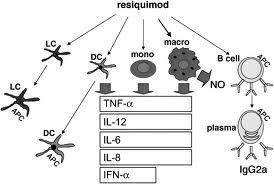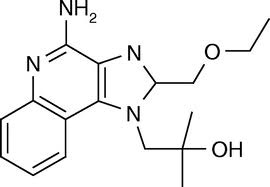Resiquimod is an imidazoquinolinamine Toll-like receptor (TLR) agonist with potential immunostimulatory activity.
Resiquimod binds to and activates TLRs 7 and 8, mainly on dendritic cells (DCs), macrophages, and B-lymphocytes, which results in the activation of the TLR signaling pathway and nuclear translocation of the transcription activator NF-kB another transcription factors; subsequently, the production of cytokines, especially interferon-alpha (INF-a), increases, enhancing T-helper 1 (Th1) immune responses.
Resiquimod is an imidazoquinolinamine Toll-like receptor (TLR) agonist with potential immunostimulatory activity.
Resiquimod binds to and activates TLRs 7 and 8, mainly on dendritic cells (DCs), macrophages, and B-lymphocytes, which results in the activation of the TLR signaling pathway and nuclear translocation of the transcription activator NF-kB another transcription factors; subsequently, the production of cytokines, especially interferon-alpha (INF-a), increases, enhancing T-helper 1 (Th1) immune responses. In addition, topical application of resiquimod appears to activate Langerhans cells, which may result in enhanced activation of T-lymphocytes. Due to its immunostimulatory activity, this agent may potentially be useful as a vaccine adjuvant.

Figure 1. Stimulation of innate immunity. Resiquimod stimulates the secretion of IFN-alpha, TNF-alpha, IL-6, IL-8 and IL-12 from various cells including dendritic cells (DC), monocytes (mono) and macrophages (macro). Resiquimod induces the functional maturation of DC, Langerhans' cells (LC) and B lymphocytes into effective antigen-presenting cells (APC). Resiquimod promotes the development of B lymphocytes into plasma cells and the subsequent secretion of IgG2a. Resiquimod also stimulates nitric oxide (NO) production from macrophages.

Figure 2. Structure of Resiqumod.
- Decreases Herpes Simplex Virus Type 2
Resiquimod, an investigational immune response modifier and
Toll-like receptor (TLR) 7 and 8 agonist, stimulates production of cytokines that promote an antigen-specific T helper type 1 (Th1) acquired immune response. In animal models, induction of Th1-specific responses modifies experimental herpes simplex virus (HSV) infection.
- Increases the effectiveness of vaccines.
Over the past few years, numerous studies have demonstrated that targeting of antigens to immune receptors expressed by dendritic cells (DCs), such as Toll-like receptors (TLRs), elicits potent CTL responses. Therefore, the design of new adjuvants has focused on TLR agonists that elicit maturation of DCs to effectively link the innate and adaptative immune responses. The paper under evaluation describes the topical use of resiquimod, a TLR7/8 agonist, to enhance cross-priming to subcutaneously administered ovalbumin. The results obtained demonstrated that topical
resiquimod is a potent adjuvant for subcutaneous vaccines, inducing clinically relevant antigen-specific CTL responses, which protect against B16-ovalbumin tumor challenge in mice.
- Induces late preconditioning in neonatal cardiac myocytes.
Resiquimod (R-848) is another imidazoquinoline that binds to both TLR7 and TLR8, resulting in an enhanced activity profile compared to imiquimod, and the use of R-848 is a promising strategy in TLR-based immunotherapy for acute myeloid leukemia9. Coxsackierus group B type 3 (CVB3) is considered the most common cause of viral myocarditis in humans, which triggers a cardiac inflammatory response mainly through a TLR7/TLR8-dependent pathway10. Therefore, we deduced that R-848 could also initiate an inflammatory response and oxidative stress in cardiomyocytes.
Source: Topical Resiquimod 0.01% Gel Decreases Herpes Simplex Virus Type 2 Genital Shedding: A Randomized, Controlled Trial Karen E. Mark, Lawrence Corey, National Cancer Institute, Topical resiquimod: a promising adjuvant for vaccine development? M Igartua and JL Pedraz, Toll-like receptor 7/8 agonist resiquimod induces late preconditioning in neonatal cardiac myocytes.Yong-yi Wang, Sha Liu, Wikipedia.


